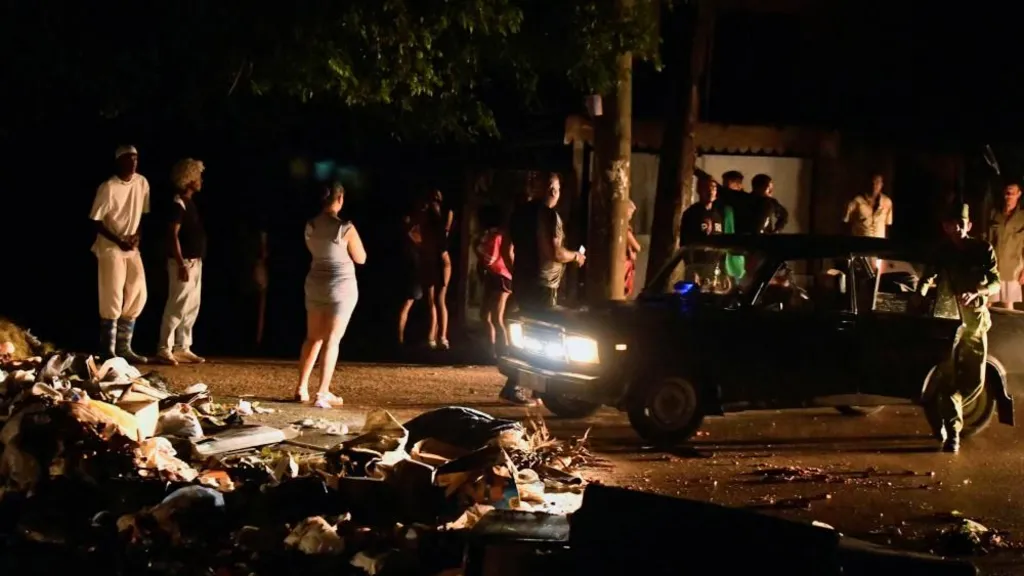Hurricane Oscar Strikes Cuba Amid Ongoing Power Crisis
3 min read
Reuters reported that small protests were held on Saturday night by residents after the electricity grid failure

Reuters reported that small protests were held on Saturday night by residents after the electricity grid failure
Hurricane Oscar has made landfall in eastern Cuba, bringing winds of nearly 80 mph (130 km/h) during a time when the island is grappling with a widespread power outage that has lasted nearly three days.
The crisis began when the main energy plant on the island failed on Friday, leaving around 10 million people without electricity. Although some power was restored on Saturday, it collapsed again shortly thereafter. Energy and Mining Minister Vicente de la O Levy has stated that the majority of residents should expect to have their power back by Monday night, with the last few customers possibly restored by Tuesday.
Oscar made landfall near Baracoa at 5:50 PM local time (9:50 PM GMT), generating waves that reached up to 13 feet (4 meters) along the coast. The storm weakened into a tropical storm shortly after making landfall, according to the U.S. National Hurricane Center (NHC), which also warned of potential flash flooding and mudslides in eastern regions.
For many Cubans, the power outage has meant enduring sweltering heat without air conditioning or fans. Food stored in refrigerators is beginning to spoil, and some families have resorted to cooking over open fires. Water supply has also been affected, as many homes rely on electric pumps.
Frustration among the populace is growing, particularly as expressed on social media. The situation has reached a critical point, with schools and businesses closed and concerns about the operational capacity of hospitals.
President Miguel Diaz-Canel assured the public that local authorities were working diligently to protect both people and economic resources in light of Hurricane Oscar’s impending arrival. The recent blackout followed the shutdown of the Antonio Guiteras power plant in Matanzas, the largest power facility in Cuba, which went offline around 11:00 AM local time on Friday.
The president has pointed to the long-standing U.S. embargo as a significant factor hampering the acquisition of essential supplies and replacement parts for Cuba’s energy infrastructure. Cuban Foreign Minister Bruno Rodríguez echoed these sentiments on social media, suggesting that lifting the embargo could eliminate blackouts and provide support to the Cuban people if the U.S. government chose to do so.

This year, Cuba has also faced a decline in crucial fuel shipments from Venezuela, further complicating its energy issues. In response to the escalating crisis, Cuban officials announced that all schools and non-essential activities, including nightclubs, would close until Monday. Non-essential workers were advised to stay home to conserve electricity, and many government services deemed non-vital were suspended.
“This is crazy,” said Eloy Fon, an 80-year-old pensioner in central Havana. “It shows the fragility of our electricity system… We have no reserves, there is nothing to sustain the country; we are living day to day.”
Bárbara López, a 47-year-old digital content creator, reported struggling to work during the outage. “It’s the worst I’ve seen in 47 years,” she stated. “They’ve really messed up now… We have no power or mobile data.”
Prime Minister Manuel Marrero addressed the nation in a televised message, attributing the failures to deteriorating infrastructure, fuel shortages, and rising demand. “The fuel shortage is the biggest factor,” he explained.
Alfredo López Valdés, head of the National Electric Union (UNE), also acknowledged the ongoing energy challenges, attributing the extensive blackouts primarily to shortages.
In Cuba, prolonged outages—especially those of this magnitude—are particularly sensitive issues, given their potential to incite public unrest. In July 2021, widespread protests erupted across the island in response to similar power shortages. The Cuban government has increasingly recognized that many citizens are no longer hesitant to voice their grievances.
In March, hundreds protested in Santiago, Cuba’s second-largest city, demanding action against chronic blackouts and food shortages. As conditions continue to deteriorate, the Cuban government may face mounting pressure to address the widespread discontent among its citizens.